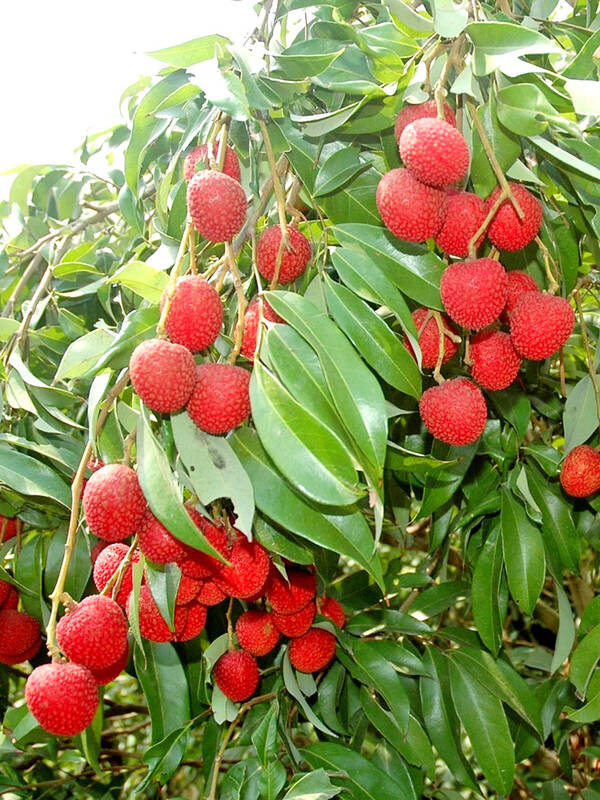Applications for plant breeders’ rights (PBR) for four Taiwanese lychee varieties have been approved by Australia, marking the official entry of Taiwanese fruit tree varieties into Australia, the Taiwan Agricultural Research Institute said on Wednesday.
Two lychee varieties, “Tainung No. 6 (Colorful Lychee)” and “Tainung No. 7 (Early Big)” obtained the PBR from Australia this year following the country’s approval of the PBR for “Tainung No. 5 (Ruby)” and “Tainung No. 3 (Rose Red)” last year, it said.
That made lychees the first Taiwanese fruit granted PBR by Australia, institute Chiayi Agriculture Experiment Branch director Chang Che-wei (張哲瑋) said.

Photo courtesy of the Taiwan Agricultural Research Institute
Australia is a member state of the International Union for the Protection of New Varieties of Plants, which establishes plant variety certification criteria according to trait variations, the institute said.
A plant variety’s distinctness, uniformity and stability would be evaluated based on such criteria to determine whether it can obtain the PBR, it said.
However, Taiwan is not a member state of the union and its applications for overseas variety rights used to be lengthy processes, particularly as the certification systems and report formats of Taiwan are different from the union, Chang said.
The lychee varieties would have had to be sent to Australia for cultivation and comparison with designated Australian lychee varieties, if past practice was to be followed, he said.
It could have taken the institute six to seven years to have these lychee varieties granted PBRs, as lychee seedlings require four years to mature and bear fruits, and the whole certification process conducted in Australia would have required an extra two years, Chang said, adding that the previous practice was also costly.
“It cost about NT$60,000 simply to have a local expert attend a meeting in Australia,” he said.
Therefore, the institute first had Taiwanese breeders accredited by Australia to work as plant variety qualified persons this time, so that the four lychee varieties could be bred and certified in Taiwan to apply for the Australian PBR, Chang said.
“That significantly saved time and costs required for certification in Australia,” he said, adding that the experience can serve as a reference for future overseas PBR applications.
The institute said that PBRs not only provide legal protections, but also pave the way for Taiwanese fruit varieties to expand into international markets.
Previous achievements in fruit tree variety development usually could not be turned into commercial benefits, as asexual propagation used to lead to the leakage of newly developed varieties, it said.
With the PBR of targeted international markets, such as the Australian PBR for the lychee varieties, illegal propagation or sales can be prevented to help foster a global market for Taiwan-bred varieties, the institute said, adding that the PBR also helps increase the product value and distinctiveness of Taiwanese lychees in Australia.

US climber Alex Honnold is to attempt to scale Taipei 101 without a rope and harness in a live Netflix special on Jan. 24, the streaming platform announced on Wednesday. Accounting for the time difference, the two-hour broadcast of Honnold’s climb, called Skyscraper Live, is to air on Jan. 23 in the US, Netflix said in a statement. Honnold, 40, was the first person ever to free solo climb the 900m El Capitan rock formation in Yosemite National Park — a feat that was recorded and later made into the 2018 documentary film Free Solo. Netflix previewed Skyscraper Live in October, after videos

Starting on Jan. 1, YouBike riders must have insurance to use the service, and a six-month trial of NT$5 coupons under certain conditions would be implemented to balance bike shortages, a joint statement from transportation departments across Taipei, New Taipei City and Taoyuan announced yesterday. The rental bike system operator said that coupons would be offered to riders to rent bikes from full stations, for riders who take out an electric-assisted bike from a full station, and for riders who return a bike to an empty station. All riders with YouBike accounts are automatically eligible for the program, and each membership account

A classified Pentagon-produced, multiyear assessment — the Overmatch brief — highlighted unreported Chinese capabilities to destroy US military assets and identified US supply chain choke points, painting a disturbing picture of waning US military might, a New York Times editorial published on Monday said. US Secretary of Defense Pete Hegseth’s comments in November last year that “we lose every time” in Pentagon-conducted war games pitting the US against China further highlighted the uncertainty about the US’ capability to intervene in the event of a Chinese invasion of Taiwan. “It shows the Pentagon’s overreliance on expensive, vulnerable weapons as adversaries field cheap, technologically

NUMBERS IMBALANCE: More than 4 million Taiwanese have visited China this year, while only about half a million Chinese have visited here Beijing has yet to respond to Taiwan’s requests for negotiation over matters related to the recovery of cross-strait tourism, the Tourism Administration said yesterday. Taiwan’s tourism authority issued the statement after Chinese-language daily the China Times reported yesterday that the government’s policy of banning group tours to China does not stop Taiwanese from visiting the country. As of October, more than 4.2 million had traveled to China this year, exceeding last year. Beijing estimated the number of Taiwanese tourists in China could reach 4.5 million this year. By contrast, only 500,000 Chinese tourists are expected in Taiwan, the report said. The report